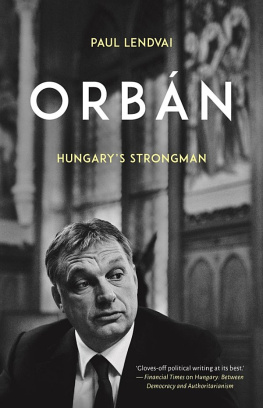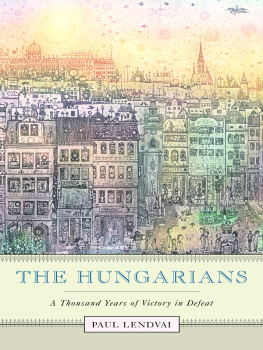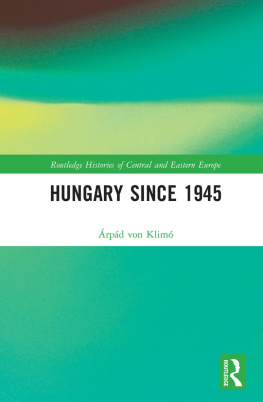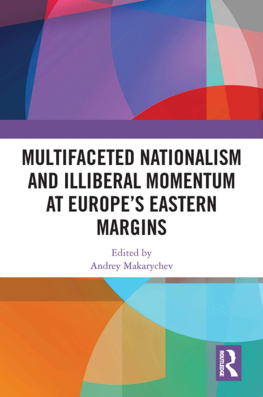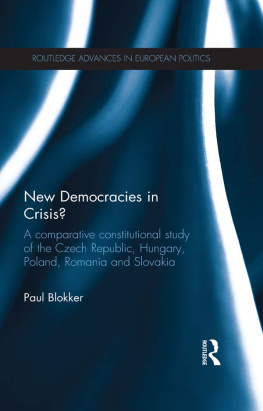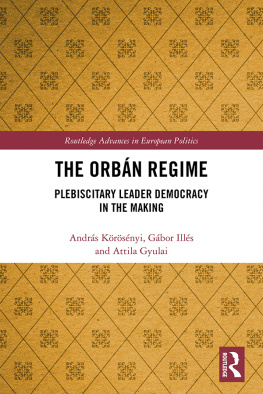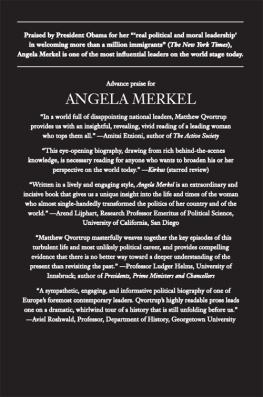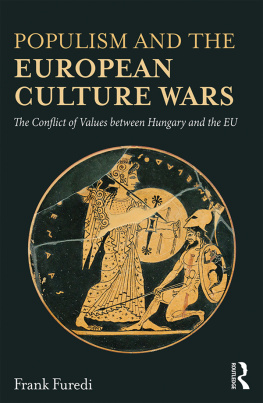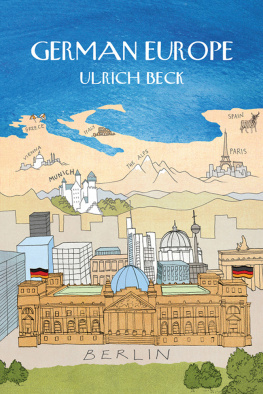ORBN
PAUL LENDVAI
Orbn
Europes New Strongman


Oxford University Press is a department of the University of Oxford. It furthers the Universitys objective of excellence in research, scholarship, and education by publishing worldwide.
Oxford New York Auckland Cape Town Dar es Salaam Hong Kong Karachi Kuala Lumpur Madrid Melbourne Mexico City Nairobi New Delhi Shanghai Taipei Toronto
With offices in Argentina Austria Brazil Chile Czech Republic France Greece Guatemala Hungary Italy Japan Poland Portugal SingaporeSouth Korea Switzerland Thailand Turkey Ukraine Vietnam
Oxford is a registered trade mark of Oxford University Press in the UK and certain other countries.
Published in the United States of America by
Oxford University Press
198 Madison Avenue, New York, NY 10016
Copyright Paul Lendvai 2016
All rights reserved. No part of this publication may be reproduced, stored in a retrieval system, or transmitted, in any form or by any means,without the prior permission in writing of Oxford University Press, or as expressly permitted by law, by license, or under terms agreed with the appropriate reproduction rights organization. Inquiries concerningreproduction outside the scope of the above should be sent to the Rights Department, Oxford University Press, at the address above.
You must not circulate this work in any other form and you must impose this same condition on any acquirer.
Library of Congress Cataloging-in-Publication Data is available Paul Lendvai
Orbn: Europes New Strongman
ISBN: 9780190911591
CONTENTS
This book deals with the history of Hungary since the collapse of the Communist system and above all with developments since the conquest of power in 2010 by Viktor Orbn and his Fidesz party. My main intention in this work, which was first published in German in 2016, was to provide a truthful and dispassionate account of Viktor Orbns stunning career, even of politics and actions which I deplore.
Still in his early fifties, Orbn, the ablest and most controversial politician in modern Hungarian history, has not only shaped events in Hungary, but has also played a major role in European politics. He was the youngest prime minister in Europe in 19982002, and since his two overwhelming electoral victories in 2010 and 2014 he has ruled Hungary as the undisputed Number One.
I was born and brought up in Budapest, and as a child and a young man I was both directly and indirectly affected by the demons of nationalism and ethnic hatred. After my flight to Vienna following the crushing of the 1956 October Revolution, I worked as a foreign correspondent (with twenty-two years on the Financial Times) and as a political writer and television commentator. My books on Austria, the Balkans, Hungary and Eastern Europe have tried to present a balanced picture, avoiding partisanship toward any particular nation or cause.
As a Hungarian-born Austrian author with Jewish parents and a Hungarian wife, now living in Vienna but travelling and lecturing frequently around the world, I have always tried to avoid sweeping generalisations. I have neither assets nor interests in my native homeland and my undivided loyalty is to Austria, which since 1957 has given melike hundreds of thousands of other refugees from many countriesthe chance to start a new life in freedom.
In view of numerous important events, I have added a comprehensive new final chapter to the translation of the German text. Following my frequent trips to Hungary both before and after 2010, the insights offered here into the often turbulent history of a country of extraordinary contradictions have been formulated neither with cynical indifference nor with partiality toward any particular group. The book is based on documents, as well as on personal impressions and conversations with politicians, scholars and many friends in Hungary and abroad.
I must thank above all my wife, Zska, who, despite her engagement with Nischen Verlag publishing German translations of contemporary Hungarian literature, has done her best to provide ideal working conditions for my writing this book.
Vienna, June 2017
How important are people and personalities in politics? In the democratic states, the political and economic crises that have afflicted the world since the banking collapse of 2008, the consequences of international terrorism and cross-border migration, are reflected both in a great critical unease about parliamentary debate and in opinion polls expressing a passionate longing for a strongman. The human factor remains difficult to comprehend, even incalculable, yet without it all historic events are incomplete. All too often not only in global history, but also in the contemporary history of Central and Eastern Europe, conflicts between progressive and reactionary forces, between openness and isolation, have been bound up with almost dramatic changes in the personalities of political leaders.
The maxim that men make history originates with the notions of hero worship expressed by the once very popular Scottish historian Thomas Carlyle: The history of the world is but a biography of great men. According to the German philosopher Georg Friedrich Wilhelm Hegel, however, the spirit of the world and of the age is much more decisive than either people or personalities. Karl Marx and Friedrich Engels believed that politics is dependent on the material conditions of production. The question of which forces have moved a leading politician and which forces he himself has set into motionthat is, the combination of external factors and personal actionstill constitutes the central problem in describing and evaluating political personalities today.
If chroniclers In the age of the global communications revolution and the dissemination of social media, such reflections have become even more pertinent.
The turbulent history of the Central and East European states, and the perplexing changes in the positions of the men and women at the head of their governments and states, confirm time and again the warnings of Isaiah Berlin, the great British thinker born in Riga, who in 1988that is, before the great political upheavals of the following yearcautioned that history should not be seen as an autobahn from which major deviations cannot occur I believe in pluralism and do not believe in historical determinism. At crucial moments, at turning points chance, individuals and their decisions and acts, themselves not necessarily predictableindeed, seldom socan determine the course of history We havent much choice. Let us say one per cent. But that one per cent can make all the difference.
In discussion with the Iranian philosopher Ramin Jahanbegloo, Berlin explored some to his becoming the symbol of goulash communism with petty freedoms, illustrates the importance of the personality.
In his 1989 essay The Heroes of the Withdrawal, the German writer Hans Magnus Enzensberger ironically described the achievements of Kdr and Gorbachev, as well as the Polish head of state General Wojziech Jaruzelski, as those of demolition contractors in the dismantling of their own systems. But an equally valid assessment of these and many other personalities is Hegels verdict that, when the historical moment is past, when the heroes have completed the task they had to fulfil, then history throws them away like empty shells. This ultimately is what happened to such contrasting figures as Chancellor Konrad Adenauer, the founding father of the Federal Republic of Germany, or Willy Brandt, the architect of the German Ostpolitik, and, on the other side of the Iron Curtain, the geriatric Hungarian party boss Kdr, who in declining health and after a series of mishaps was toppled with the agreement of Gorbachev. The careers of some leading politicians reflect what Jakob Burckhardt called relative greatness in his famous

